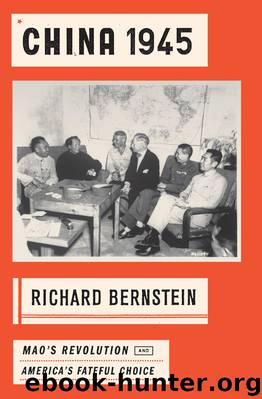China 1945 by Richard Bernstein

Author:Richard Bernstein [Bernstein, Richard]
Language: eng
Format: epub
ISBN: 978-0-385-35351-9
Publisher: Random House Inc.
Published: 2014-11-03T16:00:00+00:00
The person on the receiving end of these communications was the head of the China desk in the Bureau of Far Eastern Affairs, John Carter Vincent, a distinguished-looking forty-five-year-old Kansan who’d had half a dozen assignments in far-flung posts in China, including as minister-counselor of the embassy in Chungking, where he knew the leading China hands well—not that he always shared their opinions. Vincent, like most of the Foreign Service professionals, had a low opinion of Hurley, and he liked Davies and Service, the most ardent advocates of building ties with the Communists, but he also thought they were a bit rhapsodic in their visions of Mao and his cohort. “They overdid it,” Vincent told his biographer, Gary May, speaking of Davies and Service, who were a decade or so younger than Vincent, more impatient than he was, and prone, because of their awareness of Chiang’s shortcomings, to “ascribe all virtue to the Communists,” as he put it in a speech in 1944, not mentioning Davies and Service by name but clearly having them in mind.
Vincent was pretty sure that Hurley’s mission would fail, and though he had an aversion to the Communists, without any truly attractive options his policy recommendation was pretty close to that of the China hands. The best option for the United States and for China, he felt, was for Chiang to stay in power but for him to move quickly toward a more inclusive, democratic political system—otherwise he was likely to be overthrown, most likely by the CCP. But, Vincent understood, Chiang was unlikely to relinquish one-party rule, and therefore the United States needed to have “an alternative solution,” not to find itself stuck with the failing leader of a failing government. And the alternative was more or less what Service and Davies were recommending: arming the Communists without asking Chiang’s permission to do so.
These views made their way into a State Department paper on China policy that was given to Wedemeyer when he arrived in Washington but, tellingly, was kept from Hurley. The paper was an effort to bridge the divide between those favoring all-out support for Chiang and those who wanted to build relations with the Communists. The short-term objective in China, the one Wedemeyer should concentrate on, was defeating Japan, the paper said, and this was to be achieved in the political sphere by uniting all the Chinese factions, which, of course, is what Hurley was attempting to do. It would be good, the paper allowed, if the United States were able to arm all of the factions, including the Communists, but, unfortunately, that was politically impossible—unless circumstances arose under which it became possible. If the United States at some point needed to land troops on the China coast, for example, then American commanders “should be prepared to arm the Communists.” Moreover, while American policy was to encourage a unified China, that “did not necessarily mean that China should be united under the Generalissimo.” It was important to maintain “a degree of flexibility” in this regard.
Download
This site does not store any files on its server. We only index and link to content provided by other sites. Please contact the content providers to delete copyright contents if any and email us, we'll remove relevant links or contents immediately.
| Arms Control | Diplomacy |
| Security | Trades & Tariffs |
| Treaties | African |
| Asian | Australian & Oceanian |
| Canadian | Caribbean & Latin American |
| European | Middle Eastern |
| Russian & Former Soviet Union |
The Secret History by Donna Tartt(16622)
The Social Justice Warrior Handbook by Lisa De Pasquale(11489)
Thirteen Reasons Why by Jay Asher(7788)
This Is How You Lose Her by Junot Diaz(5770)
Weapons of Math Destruction by Cathy O'Neil(5036)
Zero to One by Peter Thiel(4824)
The Myth of the Strong Leader by Archie Brown(4789)
Promise Me, Dad by Joe Biden(4447)
Beartown by Fredrik Backman(4415)
Stone's Rules by Roger Stone(4415)
How Democracies Die by Steven Levitsky & Daniel Ziblatt(4398)
The Fire Next Time by James Baldwin(4342)
100 Deadly Skills by Clint Emerson(4076)
A Higher Loyalty: Truth, Lies, and Leadership by James Comey(4032)
Rise and Kill First by Ronen Bergman(4012)
The David Icke Guide to the Global Conspiracy (and how to end it) by David Icke(3881)
The Farm by Tom Rob Smith(3872)
Secrecy World by Jake Bernstein(3782)
The Doomsday Machine by Daniel Ellsberg(3730)
